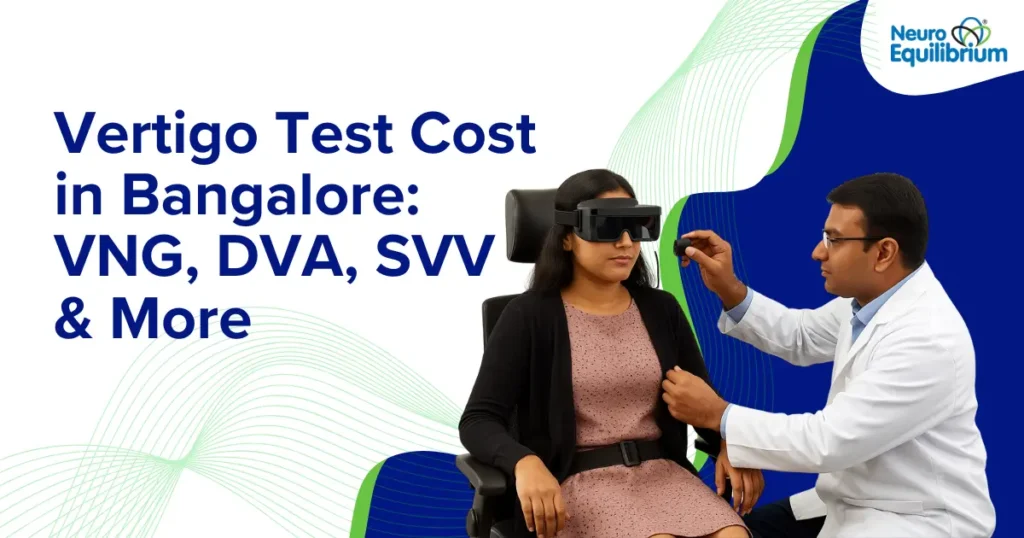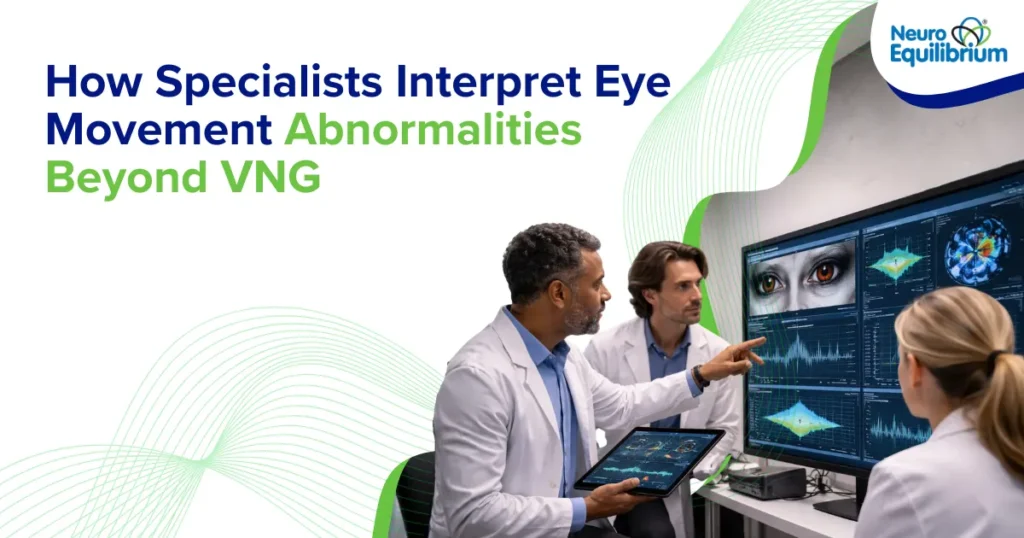Vertigo isn’t a disease; it’s actually a symptom of other conditions. People often describe it as a feeling of spinning, wobbliness, or ‘chakkar.’ This unsettling sensation can really take a toll on daily activities and impact the overall quality of life. The balance system, primarily located in the inner ear, works closely with various other parts of the body, including the brain. When there’s an issue within this intricate system, vertigo can arise.
Many underlying conditions can cause vertigo involving the inner ear or the brain. Common causes include:
- Benign Paroxysmal Positional Vertigo (BPPV) is caused by displaced calcium carbonate crystals (otoliths or “stones in the ear”) in the inner ear’s semicircular canals.
- Meniere’s Disease, a disorder where increased pressure of inner ear fluid leads to episodes of vertigo, hearing loss, tinnitus, and ear fullness.
- Vestibular Neuritis or Labyrinthitis are infections that cause inflammation of the balance nerve or inner ear structures, leading to acute vertigo.
- Vestibular Migraine is a form of migraine where vertigo or dizziness is the predominant symptom.
- Less commonly, vertigo can be a symptom of more dangerous disorders like stroke, multiple sclerosis, brain tumours (such as acoustic neuroma), or systemic disorders like blood pressure fluctuations, anaemia, or uncontrolled diabetes.
With so many possible causes, diagnosis is of utmost importance. Treatment for vertigo depends on figuring out the exact underlying cause of it. Although medication temporarily suppresses symptoms, a detailed examination is required to find the cause and the appropriate treatment.
Know More About Vertigo
- What is Vertigo? Causes, Symptoms, & Treatment
- Beware of Falls: The Importance of Fall Prevention in Elderly
- Top 3 Essential Vertigo Tests: How to Identify and Manage Balance Disorders
Common Tests for Vertigo Diagnosis
To figure out why you’re feeling dizzy, the doctor will start by asking questions about your symptoms, do a physical check-up, and run a few special tests. These tests check how well your balance system (called the vestibular system) is working.
One of the key tests is the Videonystagmography (VNG). It focuses on the movements of your eye to know if there is a problem with balancing. The doctor is looking for rapid and jumping eye movements known as nystagmus which is helpful in determining what is causing your dizziness. VNG also includes positional tests with which they try to find out if any dislocated crystals (otoconia), are moving along the semicircular canals of the inner ear.
These tests help your doctor understand what’s going wrong and how to treat it
Several other relevant tests are used in the evaluation of vertigo and balance disorders:
- Dynamic Visual Acuity (DVA) evaluates how well a person can see clearly when their head is in motion. This test is crucial because, in everyday activities like walking, driving, or playing sports, the head often moves while trying to maintain clear vision. A decline in DVA may indicate issues such as vestibular hypofunction or imbalance, leading to blurred vision or difficulty maintaining focus during motion.
- Subjective Visual Vertical (SVV) measures an individual’s internal sense of what is “vertical.” It is a test of how accurately someone perceives upright orientation relative to gravity. This ability is largely governed by the utricle, one of the otolith organs in the inner ear. SVV testing helps differentiate between peripheral and central vestibular disorders and is particularly valuable in diagnosing otolith dysfunction.
- Video Head Impulse Test (vHIT) tests the function of particular areas of the inner ear balance system.
- Audiometry (hearing tests) tests hearing and may also be used to diagnose inner ear diseases such as Meniere’s disease.
- Posturography measures balance and stability.
- Neurological Examinations determine if a brain or nerve disorder is contributing to dizziness.
- Evaluation of blood pressure and pulse when lying down and standing can identify postural hypotension, a cause of unsteadiness.
Specialised vertigo and balance clinics, such as NeuroEquilibrium, utilize advanced technology and these tests to provide a comprehensive evaluation and reach an accurate diagnosis, which guides the customized treatment plan for each patient.
Cost Breakdown of Vertigo Tests
The cost of vertigo testing depends on the combination of tests recommended by your doctor based on your symptoms and medical history. A typical vertigo profile test battery, which may include tests like Videonystagmography (VNG), Subjective Visual Vertical (SVV), and Dynamic Visual Acuity (DVA), starts from ₹6,000. Additional tests such as hearing assessments like pure tone audiometry, or an MRI scan with a vertigo protocol may be advised in certain cases. The final cost will vary based on the number and type of tests required and the diagnostic center you visit.
Does Insurance Help Pay for This?
In most cases, health insurance does not cover the cost of vertigo diagnostic tests, especially when they are done on an outpatient basis. Tests like VNG, SVV, DVA, audiometry, or even an MRI for vertigo are often considered diagnostic procedures and may not fall under standard coverage unless you’re admitted to a hospital or meet specific criteria outlined in your policy.
While a few insurance plans might offer partial reimbursement or cover certain tests, this is the exception rather than the rule. It’s always a good idea to review your health insurance policy carefully or speak directly with your provider to confirm whether the specific tests you need are covered, and whether the hospital or clinic offers cashless or reimbursement options. Being informed in advance can help you avoid unexpected out-of-pocket expenses.
Preparation for the Test
In order to take a vertigo test, there may be a few simple steps you may have to do first:
- Patients should not have heavy meals immediately before the vertigo test. This helps get clearer results.
- Avoid wearing makeup (especially around the eyes), since it might interfere with some of the cameras used during the test.
- Tell your doctor about any medicines you’re taking. They might ask you to stop certain medicines (especially for dizziness or allergy) a day or two before the test.
- Wear comfortable clothes and bring someone along, just in case you feel dizzy afterward.
Duration and Process
- Total time consumed for the whole set of vertigo tests – VNG,SVV,DVA is around 1.5 hours. You’ll wear special goggles that record your eye movements while you look at moving lights or follow certain patterns. Sometimes air or water is gently put in your ears to check how your inner ear reacts.
During both tests, you just need to relax and follow instructions from the technician.
Discomfort or Side Effects with Vertigo Tests
These tests are painless. But some people might feel:
- A bit dizzy or lightheaded during or right after the test – that’s normal and goes away in a few seconds to minutes.
- Tired, because focusing or staying still for a while can feel a little draining.
Choosing the Right Diagnostic Center
Feeling dizzy or off-balance can be tough, and it’s important to find a testing facility that really knows what they’re doing. To help you find a great clinic, look for professionals who specialize in vertigo and balance issues. Make sure they use modern, precise testing equipment for tests like VNG. Checking out reviews or asking people about their experiences can really help, too. Choosing a certified clinic that many patients trust will give you peace of mind!
If you’re in Bangalore, NeuroEquilibrium Clinics are an excellent choice. We specialize in dizziness, vertigo, and balance disorders. Our expert doctors utilize advanced technology to determine exactly what’s causing the problem and how to resolve it.
You can book a clinic visit at any of their locations across Bangalore:
📍 Malleswaram
Margosa Road, Bangalore – 560003
Book Clinic Visit
📍 Sahakar Nagar
Kodigehalli Main Rd, E Block, Bangalore – 560092
Book Clinic Visit
📍 HSR Layout (Sector 6)
Bangalore – 560102
Book Clinic Visit
📍 JP Nagar (7th Phase)
Bangalore – 560076
Book Clinic Visit
📍 HSR Layout (Sector 7)
Bangalore – 560102
Book Clinic Visit
📍 Yeshwanthpur (Brigade Gateway)
Bangalore – 560055
Book Clinic Visit
Conclusion
If you’re dealing with frequent dizziness, balance problems, or spinning sensations, getting the right diagnostic tests, is essential for finding the root cause and starting effective treatment. Bangalore has several options for these tests, and while costs can vary depending on the clinic and your insurance coverage, timely diagnosis is key to avoiding long-term discomfort. For accurate testing and expert care, consider NeuroEquilibrium Clinics in Bangalore, which offers advanced diagnostic technology and personalized treatment plans to help you regain your balance and quality of life.
FAQs
How much does a vertigo test like VNG cost in Bangalore?
The cost of vertigo tests such as Videonystagmography (VNG) in Bangalore typically ranges from ₹4,000 to ₹12,000, depending on the diagnostic facility and the range of assessments included. Some centers may also include additional evaluations like Dynamic Visual Acuity (DVA) and Subjective Visual Vertical (SVV) tests as part of a comprehensive vestibular screening. The overall cost can increase if multiple tests are required based on your symptoms and your ENT or neurologist’s recommendations. Keep in mind, these tests are usually not covered by most health insurance policies when conducted as outpatient procedures, so it’s best to check with your provider in advance.
Book a consultation at your nearest NeuroEquilibrium Clinic today.
Are tests for vertigo insured in India?
In most cases, vertigo tests are not covered by health insurance in India, especially when done on an outpatient basis. These tests are usually considered diagnostic procedures, and many insurance policies do not include them unless they are part of a hospitalization. While a few plans may offer limited outpatient coverage or reimbursement, this is relatively rare. It’s best to check the specifics of your insurance policy or speak directly with your insurer before scheduling the tests to avoid unexpected expenses.
Book a consultation at your nearest NeuroEquilibrium Clinic today.
What is the preparation for test for vertigo?
Eye makeup to be avoided and some medications has to be withheld as per the suggestion by your doctor prior to the test. Always heed the exact instructions provided by your doctor or testing center.
Book a consultation at your nearest NeuroEquilibrium Clinic today.
Do vertigo tests hurt or are they dangerous?
No, Vertigo tests are non invasive and painless. A few may experience transient dizziness during or following the test but serious side effects are uncommon.
Book a consultation at your nearest NeuroEquilibrium Clinic today.
Where do I get credible vertigo testing in Bangalore?
Vertigo test can be performed at Vertigo specialised NeuroEquilibrium clinics associated with experienced doctors and located at most of the prime locations in Bangalore like Malleswaram, HSR Layout, JP Nagar, Whitefield and Yeshwantpur.
Book a consultation at your nearest NeuroEquilibrium Clinic today.
















